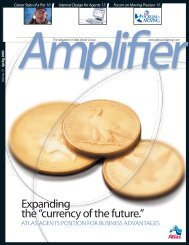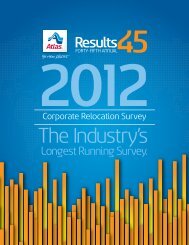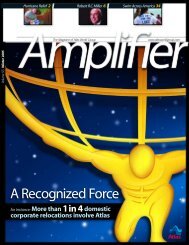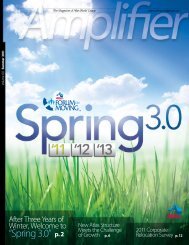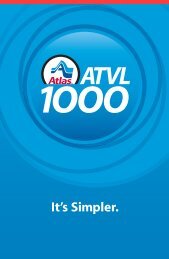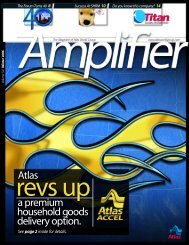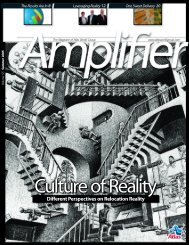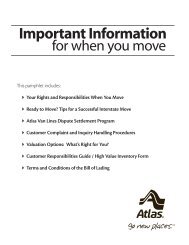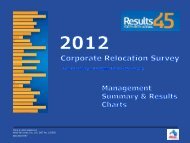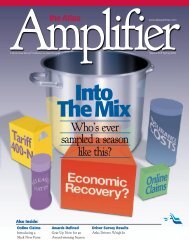Interstate MigrationInterstate and Cross-BorderMigration 2006Where is everybody going?What determines the paths that people takeas they follow their dreams and ambitions? Thelure of economic opportunity inspires someto pack their bags. Occasionally, forces of calamity,like those that befell the Gulf Coast in 2005, pushpeople to unexpected places. Sometimes, it seems,people move in step with an uncertain wind that isforever changing direction.During 2006, <strong>Atlas</strong> handled nearly 100,000 shipments ofhousehold goods across North America. The numbersshow few migratory swings and no surprises, with thepossible exception that no state moved to outboundstatus. Louisiana experienced the largest percentage ofpeople moving out. Several others lost momentum–Montana, New Hampshire and Vermont all went frominbound to balanced status. Among areas gaining ground,Washington, D.C. experienced the highest percentage ofinbound moves. Alabama, Georgia and Kentucky eachmoved from balanced to inbound status.West Virginia, which over the last several years has seesawedbetween outbound and balanced, also moved frombalanced to inbound. In the northeast, Maine went fromoutbound to balanced. The three most active states, basedon total inbound and outbound shipments, wereCalifornia (17,892), Texas (16,526) and Florida (14,710).The states with the three lowest totals were NorthDakota (289), Alaska (330) and Vermont (384).Regional DevelopmentsIn terms of regional movement, the survey datasuggested the following patterns of interest.Deep-South DepartureSouthern states recorded some of the highest outboundpercentages. In Louisiana 66 percent (1,966 moves)were outbound; in Mississippi 60 percent (1,078 moves)departed. Not surprisingly, the surrounding statesexperienced an influx. Texas received more than 30percent of Louisiana’s outbound traffic and 12 percentof Mississippi’s. Georgia, an inbound state, recorded morethan 4,000 relocations for the third straight year and sawits lowest number of outbound shipments since 1996.Northeastern ExodusNew York continued its 12-year outbound trend with thesecond-largest percentage of outbound traffic in thenation. Most of these departures headed south and west:California and Florida received 633 and 632 shipmentsfrom New York, respectively. Massachusetts, New Jerseyand Ontario also saw more people leaving than entering.Westward ExpansionOregon remains a magnetic destination, with 63 percentof its traffic inbound–the second-highest percentage inthe country. Most shipments came from neighboringstates California and Washington. Farther north, Alaskamaintained a healthy percentage of inbound moves.New Mexico, Colorado and North Dakota also continuedto attract residents.Commotion in CanadaIn Canada, Alberta and Nova Scotia moved fromoutbound to balanced status while Newfoundlandwent from balanced to inbound. The most active of theprovinces was Ontario, with 2,133 inbound and outboundrelocations. British Columbia came in a distant second with619 total relocations. Least active were the Yukon Territory(1 move out) and New Brunswick (30 total relocations).Inbound, Outbound, Balanced?<strong>Atlas</strong> classifies states as inbound, outbound or balancedaccording to a threshold value, determined by this formula:Total Shipments x .55 = Threshold Value• If the number of outbound shipments exceeds thethreshold, the state is classified as outbound.• If the number of inbound shipments exceeds thethreshold, the state is considered inbound.• If neither inbound nor outbound shipments exceedsthe threshold, the state is termed balanced.16 <strong>Atlas</strong> <strong>Amplifier</strong> • Summer 2007<strong>Atlas</strong> <strong>Amplifier</strong> • Summer 2007 17
Acceleration!Acceleration!<strong>Atlas</strong>’ Premium Delivery Option Takes Off“If you had something this fast, you’d paint it like this, too.”The Accel SmartVault is designed for safe, secure andefficient transit and storage.You might call it an idea whose time has come...or,as Frank Webers aptly terms it, “the solution for thesmall shipment.”Frank, President of Collins Brothers Moving & Storage(547) in Larchmont, New York, is referring to <strong>Atlas</strong> Accel,a new premium, expedited delivery option. In just a fewshort weeks of using Accel, he sees the potential for smallshipments has suddenly grown much bigger.“There have always been challenges with shipmentsunder 5,000 pounds,” says Frank. “With Accel, I can givecustomers a much shorter spread for delivery. Althoughthe transportation cost is more, they find the savings inexpenses for food and hotels–not to mention lostproductivity–is huge.”“We’ve shown this to about ten clients, and everyone of them has seen applications for their business,” saysDon Hill, President and COO of Alexander’s MobilityServices (207). “They see the value of employees beingable to select the dates, and they are extremely intriguedby the per diem cost savings.”But <strong>Atlas</strong> agents aren’t the only ones singing praises.“Customers like Accel because it lets them designtheir own move,” says Steve Hermann, <strong>Atlas</strong> AssistantVice President, Logistics. “For instance, a customer whorelocates frequently just completed a move with Acceland wrote to tell us this is exactly the service he has beenlooking for. He says he will never move any other way.”A New Idea for the Industry“Accel represents a new idea for the industry, a differentway of thinking,” says <strong>Atlas</strong> Sr. Vice President and ChiefMarketing Officer Greg Hoover, who led the Acceldevelopment team. “We started out in early 2005 bysimply looking at how we might add value and improveservice quality for customers with smaller shipments.”The idea for containerized transit evolved and, aftersecuring agreements with prime service partners, <strong>Atlas</strong>tested Accel in the field. Following an introduction in 16major metro areas in mid 2006, the planned expansionto 41 markets was achieved by the start of 2007.Because Accel is new for <strong>Atlas</strong>, not to mention theindustry, product education has been critical to itslaunch. During December and early January, <strong>Atlas</strong> trainerstraveled the country to orient agents. Fifty-two agenciesparticipated in live training events and many took part inweb-based education programs. They became familiarwith how to submit an online contract request, usethe web-based pricing application to get an instantcost estimate, and how to actually place an order.“Our goal was to roll the program out on January 1,2007,” says Greg. The effort came close, with the firstshipments taking place in mid-January. “We’re buildingmomentum,” says Greg. “In just a little over three weekswe’ve booked 40 shipments, with an average size of twovaults per shipment. One account is now registering threeor four shipments a day.”Yet Another Claim to FameAs agents and customers are finding out, Accel saves timethat equates to significant expense reductions. But it bringsanother cost advantage: fewer claims.“The industry average for claims is about one in fourshipments,” says Greg. “As our customers know, <strong>Atlas</strong> <strong>Van</strong><strong>Lines</strong> outperforms the industry, with a ratio of about one inseven. For Accel, the ratio is approximately one in thirteen.That’s phenomenal.”The claims performance in large part reflects the uniquedesign of the Accel container, a tough, lockable polymerSmartVault that includes GPS tracking for added security."It’s unbelievably strong,” says Frank, “and it’s easy to stack inthe warehouse and move around.”“When you put it all together,” says Greg, “Accel offers avalue proposition with applications for practically anyone.”Don Hill agrees. “The value is so great, it’s worth it topay a little extra and have the truck there within a one-daywindow. This concept may even someday affect the waybig shipments are handled.”“I believe Accel will continue to gain momentum,” saysFrank. “Especially when clients see the happier faces on theiremployees and the cost savings. It’s a win-win for everyone.”<strong>Atlas</strong> agents learn how they can put Accel expedited deliveryto work for their customers. <strong>Atlas</strong> conducted the trainingsessions across the country during December and January.18<strong>Atlas</strong> <strong>Amplifier</strong> • Summer 2007<strong>Atlas</strong> <strong>Amplifier</strong> • Summer 2007 19



